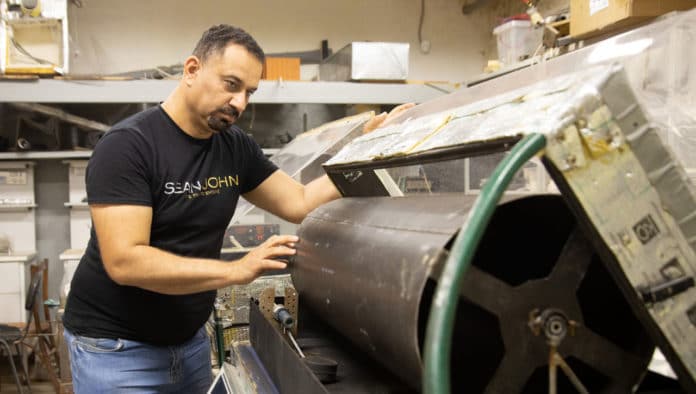Distillation of water using solar energy is considered one of the most popular desalination methods today.
Power engineers at Ural Federal University (UrFU), together with colleagues from Iraq, have developed a new desalination technology, which is claimed to be much more effective than others, by incorporating a rotating cylinder. The method proposed by the UrFU power engineers will significantly reduce the cost of desalination and will increase production volumes by four times.
The experimental new solar distiller incorporates a rectangular basin, inside of which is a horizontally oriented black steel cylinder. The basin is filled with undrinkable water, and the cylinder is slowly rotated by a solar-powered DC motor.
The rotating hollow cylinder inside the solar distiller accelerates water evaporation in the vessel by forming a thin film of water on the outer and inner surface of the cylinder, which is constantly renewed with each turn. As the film is so thin, the water film quickly evaporates due to the rapid transfer of heat from the surface of the cylinder to the adjacent water film. To increase the temperature of water under the cylinder, the engineers used a solar collector.
A prototype was tested on a rooftop in the Russian city of Ekaterinburg for several months (June-October, 2019). As part of the experiment, the rotation speed of the cylinder inside the solar distiller was 0.5 rpm. This intensity and time are enough to evaporate a thin film of water from the surface of the cylinder.
The tests showed the high efficiency and reliability of the developed device. In addition, the scientists noted that the relatively high intensity of solar radiation and low ambient air temperature also contributed to the performance of water distillation.
Read more: Nanofiber membrane makes seawater drinkable in minutes
“The performance improvement factor of the created solar distiller, compared to traditional devices, was at least 280% in the relatively hot months (June, July, and August) and at least 300% and 400% in the cooler months (September and October), at the same time, the cumulative water distillation capacity reached 12.5 l/m2 per day in summer and 3.5 l/m2 per day in winter,” commented Alharbawi Naseer Tawfik Alwan, a research engineer at the Department of Nuclear Power Plants and Renewable Energy (UrFU).
The desalination technology created in the UrFU with a simple design and low cost may be especially in demand in the Middle East and Africa – in countries with a high potential for solar energy and a shortage of freshwater.
In the future, scientists plan to improve the technology and increase the performance of the solar distiller at the lowest possible capital and operating costs for different climatic conditions.
